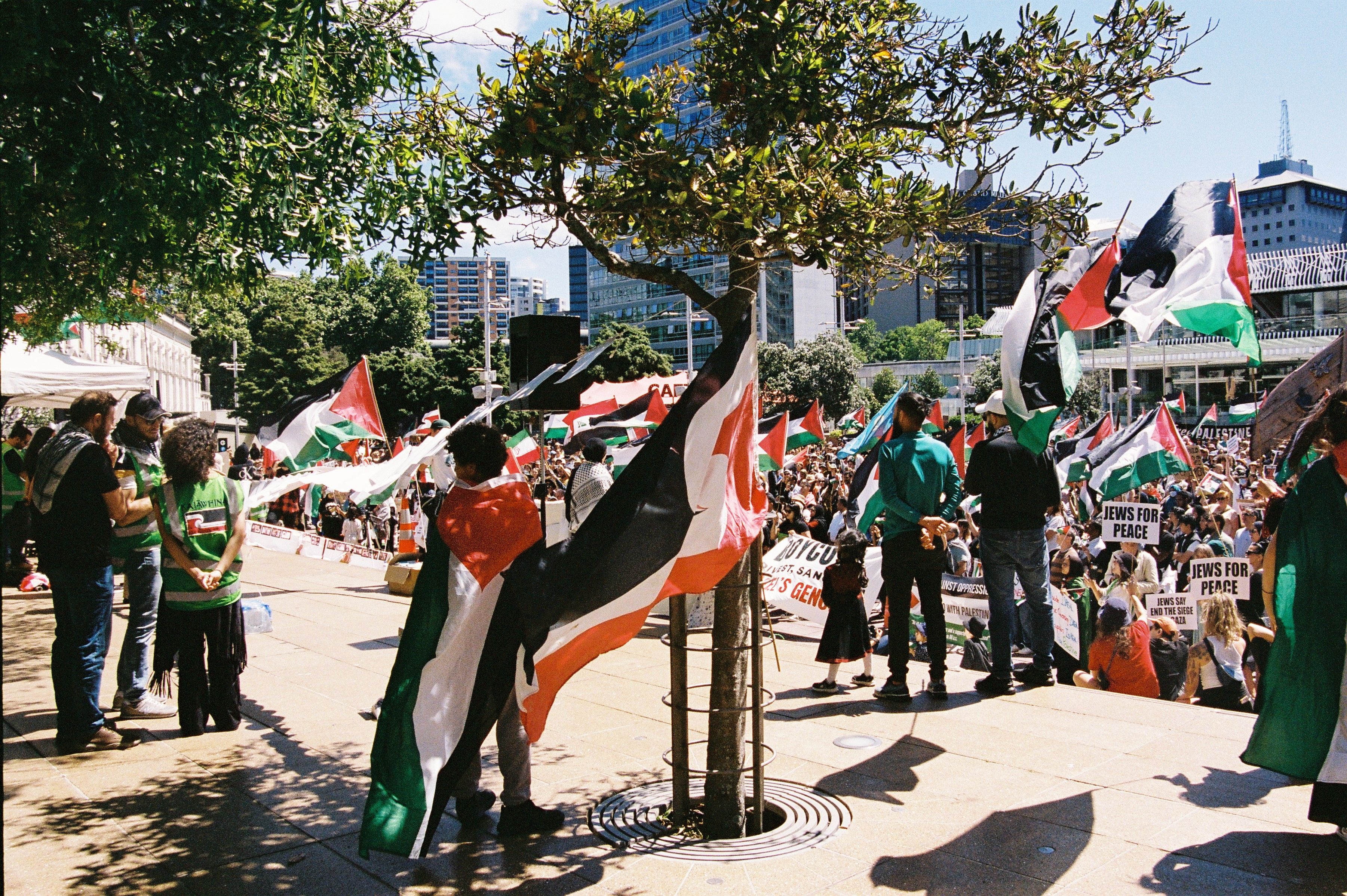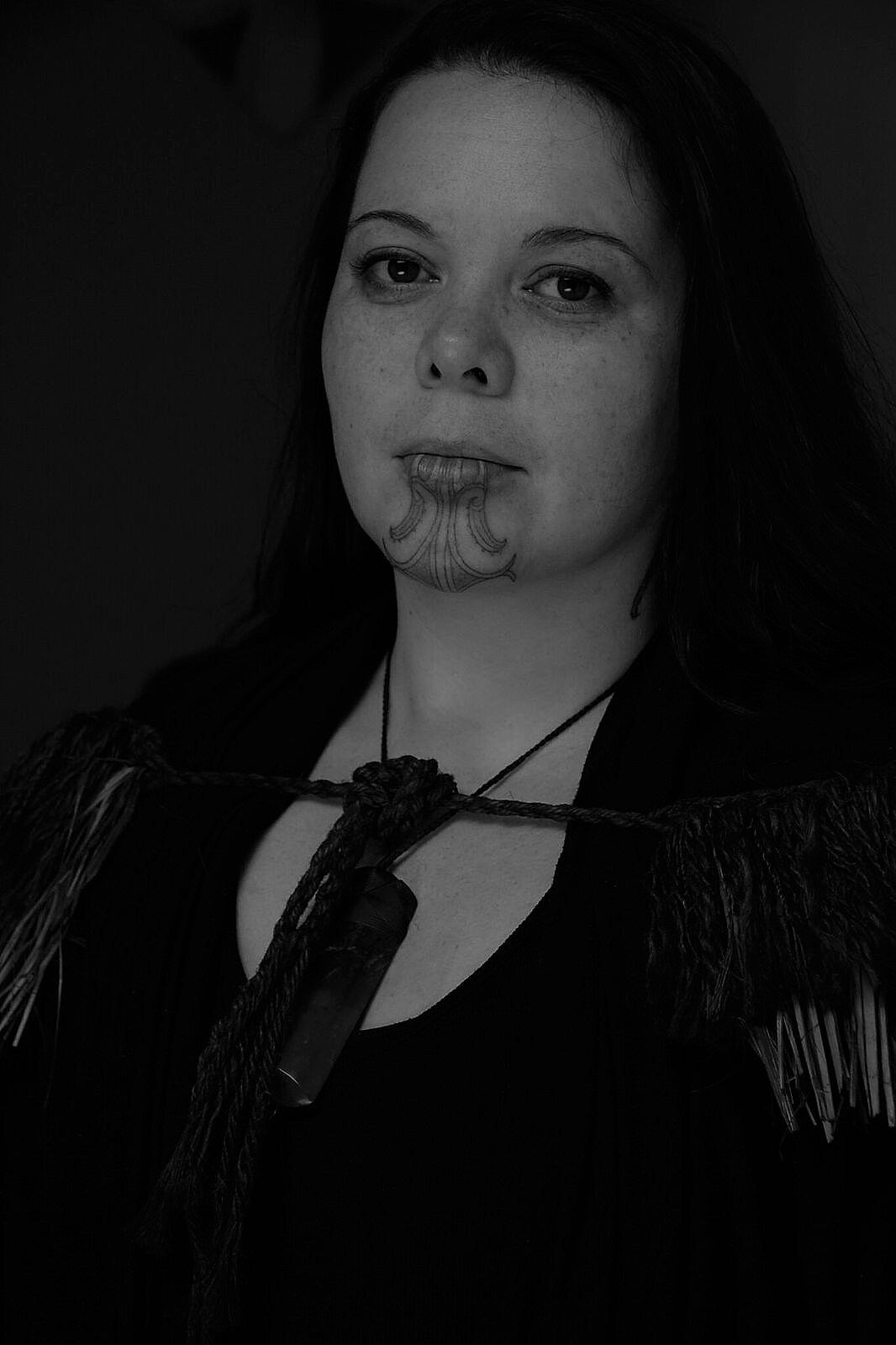Respectful Solidarity: Standing together against colonialism, on colonised lands
How do we be respectful in our displays of solidarity? Tameem Shaltoni and Tina Ngata share their perspectives on how we can best show up for Indigenous peoples struggling against colonialism worldwide.
Tameem Shaltoni is a kiwi Palestinian, born in Jordan to a family of Palestinian Arab refugees. Tina Ngata is a Ngāti Porou mother of two, author, researcher and advocate for Indigenous and Environmental rights living on her ancestral unceded lands on the East Cape of Te Ika a Māui. In this reflective piece, edited by their respective Palestinian, Tangata Whenua and activist communities, Tameem and Tina consider what respectful solidarity with the Palestinian nation looks like within the context of Aotearoa.
Nau mai rā e Hina
Taiahoahotia tō tātou ara i te pō
Nau mai rā e Tāne-te-wānanga
Arahina mai i a mātou ki te ao mārama
Nau mai rā e Rongo
Kia tau mai te māramatanga
Kia tau ai te āio
Kia toi te kupu
Kia toi te mana
Kia toitū te whenua taketake huri noa i te ao
Whakairia ake ki runga kia tina, tina
Hui e, taiki e.
As we watch the acts of solidarity take place around the country, we note, respect and deeply appreciate the aroha and concern shown by so many in Aotearoa. Every week, more and more New Zealanders, across more communities, are coming together to decry the atrocities visited against Palestine. In the tens of thousands, New Zealanders are showing up to call for an end to the collective punishment, the indiscriminate killing, the unjust occupation, and to rightfully name these acts for what they are: crimes against humanity. To know that these crimes are seen, and that so many will not stand for them, but will take a stand against them, offers a sense of hope in humanity, during very dark times.
While Aotearoa has had shining moments in its history where it has stood against injustice – the Springbok tours, the nuclear free protests, and more recently Ihumātao and Black Lives Matter – we also recognise that for many, resistance and solidarity may be new. Across multiple cultures and communities in Aotearoa, the numbers of those who stand with Palestine are growing. With this growth comes complexity, and the ever present need to respect each other, while centering those most impacted and amplifying their voices. Questions arise on how to stand in solidarity in a way that is impactful, whilst also being respectful, and how to express our outrage without compounding the problem, or perpetuating colonial harm.
We offer these reflections not as a set of rules, but as observations based on our experiences, and those of our relative communities.
Tameem
Cultural and Religious Diversity
Palestine's history is rich, and it has one of the oldest human civilisations in the world. In Palestinian culture, elders have an anchor role at gatherings and events, and special honour and respect is paid to them. Being situated at the middle of the old world, at the crossroads of trade routes and at the frontiers of ancient empires, Palestinians today are culturally, linguistically and religiously diverse. It is important that solidarity organisers reflect this diversity in their events and showcase different Palestinian cultural and religious identities when applicable. Not all Palestinians are Muslim, Sunni, and Arabic-speakers (especially here in Aotearoa New Zealand). Reflecting on Palestinians' cultural diversity, organisers are encouraged to maintain an atmosphere of inclusiveness of all cultures and religions.
Political Views and Affiliation
Palestinians, like any other nation, have varying political views internally (internal Palestinian politics) and abroad (New Zealand politics). Not all Palestinians are either conservative or progressive. Not all Palestinians agree on the best way forward, e.g. a two-state vs one-state solution, party politics, forms of resistance, approach for liberation, and constitution.
Organisers and speakers are encouraged to consider cross-party support, to unite attendees around the event’s particular objectives, and to ensure events are inclusive of people with differing political positions.
Privacy and Security
Palestinians are one of most surveilled people on earth through the use of advanced spying technologies by Israel through its complex security apparatus. Israel leverages Palestinians’ private information to blackmail them, prevent them from visiting home, and to oppress their whānau in Palestine. Therefore it is paramount that every effort is taken to protect the privacy of Palestinian attendees, speakers, and organisers, and not to share their photos or any identifiable information without consent.
Flags, Chants, and Speeches
As the solidarity events are focused on Palestine, flags, chants and speeches should be aligned with the event’s kaupapa and pre-agreed with the local Palestinian community leaders. Material that is deemed as offensive or as a detractor, as flagged by a consensus of Palestinian attendees, should be removed.
Other Struggles
While each anti-colonial struggle is unique, the Palestinian struggle shares characteristics with many other anti-colonial struggles across the world and here in Aotearoa New Zealand. A close look at the powers that maintain Israel’s colonisation of Palestine shows that they are the same powers that enabled colonisation across the world and that makes all anti-colonial struggles interconnected. Solidarity with Palestine cannot be a utility in other people’s oppression or a bystander to it. We build bridges between Palestinians’ struggle and other peoples to free us all.
Respect and Acknowledge Tangata Whenua
As we stand and live on Māori land, we respect and acknowledge tangata whenua and mana whenua where we gather. Palestinians’ freedom and self determination also are not complete without that of Māori, as global colonial powers are one. In the next section, Tina Ngata illustrates how Palestine solidarity respects tangata whenua.
Tina
Tangata Whenua Solidarity with Palestine
Our solidarity with Palestine is informed by our own experience of colonisation. When the Human Rights Commission interviewed ethnic whānau for Ki Te Whaiao Ki Te Ao Mārama, they expressed in powerful terms that the racism they experience and the barriers they encounter are inextricably linked to Aotearoa-New Zealand being a colonised country. Those subjected to colonialism recognise it well, and this is a mutual relationship - as Māori we also recognise the experience of Palestine as one of colonial violence, from 1948 until now.
Our stance with Palestine is therefore one we make from one Indigenous peoples to another. Generations of Māori resistance throughout the ‘70s, ‘80s and ‘90s have been inspired by Palestine, and we continue to stand by them as a nation with full human rights, including political self-determination. Today we use the ability to stand on our own lands, and draw upon the strength from our own intergenerational struggle against colonialism to send aroha and strength to our Palestinian brothers and sisters, and challenge all governments to recognise and respond to this injustice.
The Indigenous movement is worldwide, because colonialism has also been a global project (one which arguably started in Palestine), and we know full well that while colonialism remains in force around the world, its dark threat will also hang over our own heads. Permitting colonialism here in Aotearoa allows for it in Palestine, and permitting it in Palestine allows for it here. For this reason, we call for colonialism to end, everywhere. For this same reason, solidarity against colonialism must be something we do within our resistance actions, not just with our resistance calls.
Respecting Māori Expressions of Solidarity
Māori-Palestinian solidarity comes not just out of a sense of self-preservation, but out of a deep understanding of the injustice and intergenerational mamae (pain and grief) caused by colonial violence. It is because of our ability to remember what our ancestors were subjected to at the height of colonial violence, and the horror of seeing it happen again, today, that Māori stand. It is from our core tikanga of aroha-ki-te-tangata that we stand beside our Palestinian whānau. Our haka, our waiata, our karakia, are all spiritual and cultural calls for protection and resilience. When we open a rally with a karakia, we gather the strength of the lands, waters and ancestors of the place where we stand on that day, and focus it upon the purpose of those in attendance. It is the most appropriate, respectful and powerful way to open a space for resistance and solidarity upon colonised lands, for colonised lands.
Anti-Colonialism Within Colonised Lands
Understanding that the Israeli oppression of Palestine is colonialism is imperative to conducting respectful solidarity for Palestine in Aotearoa. In the same way that Māori connect to Palestine as a nation subjected to colonialism, all acts of Palestinian solidarity in Aotearoa exist within a context of being on colonised lands. One of the common traps allies fall into is the need to be the one to “fix” injustice which, while noble, is borne of a combination of privilege and saviourism. Solidarity is not about “fixing” injustice on behalf of others, it is about centering those most impacted, and being present with them. This may look like:
- Checking in on what their needs are
- Amplifying their voices
- Echoing their calls
- Using your relative privilege to remove barriers that they have identified
- Standing beside them and offering protection when they are at risk
- Providing resource or supporting them to acquire necessary resource
- Getting out of their way.
Be Conscious of Privilege
We’ve seen this happen over and over again, particularly in the climate movement. In Canada, for instance, white Extinction Rebellion protestors became provocateurs during protests, taking over megaphones and provoking the crowd towards anger in a way that resulted in violent clashes with police, and arrests. Without fail, when this happens, it is non-white people who are targeted, profiled by police and media, arrested, and who carry the brunt of the consequences. Carrying out these actions with respect means understanding your relative privilege, and protecting those who will inevitably have to carry the consequences of your actions. This is a growing concern where particular NGOs/resistance groups take on names that incorporate Te Reo Māori - but the group itself is not Māori. Carrying our reo with responsibility in these spaces means being transparent in your identity and conducting yourself in a way that does not lead to Māori being targeted for your actions.
Organisers - Engage Mana Whenua
One of the very basic ABCs that is often missed (and that belies just how far we have to go as a nation in our own decolonial journey) is that people rarely contact the mana whenua of the place where they intend to carry out an action. In my experience, they rarely even know who the mana whenua are, because they’ve never had to engage with them (and one can therefore deduce that they have never stood in solidarity with them). When I say mana whenua, I do not mean tangata whenua (which refers to all Maori). I mean the specific iwi and/or hapū upon whose land you are standing. Those who have to maintain relationships after you are gone, those whose land may be vandalised, those who will be left behind and potentially targeted after the action is finished. They may not see the need to be there, but they can certainly be paid the respect of being advised. This will also enable your stance against colonial racism to be localised, and longstanding.
As leading Anti-racist and Pro-Palestinian stalwart Angela Davis says, racism is a global phenomenon, which only a global movement can eradicate. This means confronting it in Palestine, in Aotearoa, in our own communities, and confronting it in ourselves. Through listening to and centering Palestinian voices and interests, and practising mindfulness of the colonial context within which we express our solidarity, we can galvanise our united efforts for a world free of colonial violence.
This piece of publishing has been supported by Auckland Pride.
Thank you for helping us continue our coverage on solidarity and Palestine.
Image by Martyn Pepperell


